People Are Living Inside Landfills as the World Drowns in Its Own Trash
IN FOCUS, HUMAN RIGHTS, HEALTH, ASIA--PACIFIC, ENVIRONMENT, 29 Oct 2018
Jacopo Pasotti and Elisabetta Zavoli – HuffPost
While the oceans fill up with plastic waste, a horrifying crisis unfolds on land.
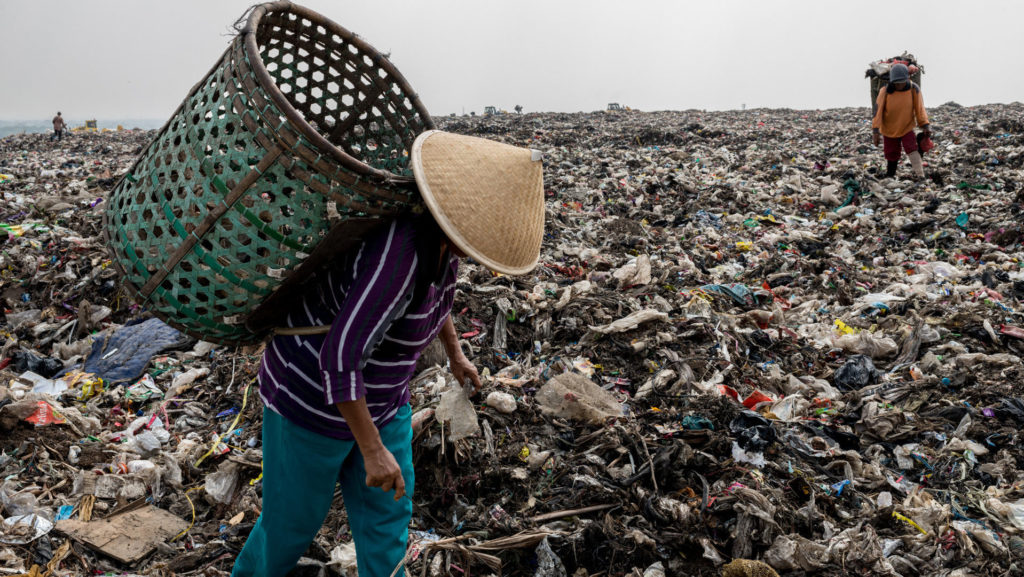
Mak Muji, 55, collects plastic garbage on the top of the waste mountain that is Indonesia’s largest landfill. Every day at dawn, she crosses the road separating her village from the trash and climbs into the dump to earn her living. In her spare time, she attends to the pregnant women who live nearby. Elisabetta Zavoli for HuffPost
23 Oct 2018 – When Sairoh felt the first stab of labor pains, she sent urgent word for the midwife.
Sairoh, who, like many Indonesians, goes by one name, was 18, and this was her first baby. As she waited for help, she swatted away swarming flies and thought about how her child would soon fill its lungs with the stink of the landfill surrounding their home. One of the first sounds to reach the infant’s ears would be the rumbling of dump trucks passing by their shack. Her baby’s first steps would be on muddy ground glittering with silvery plastic wrappers.
Finally, the midwife arrived with her simple medical kit and the calm of skill and experience. Everything would be all right while she was there.
The baby was a boy. They named him Reza. “It was a fast birth,” the midwife recalls.
Reza is 9 now. Each morning he goes to a school set up on the border of the landfill, while his mother and father squat outside their shack and sort dirty plastics salvaged by neighbors who strap on oversized baskets and climb the 80 feet of compressed refuse abutting the slum.
Trash pickers who hike into the landfill spend their days in the tropical heat combing through broken glass, medical waste, rotting food and graying plastic bags. They look for valuables, raw materials and recyclables to exchange for cash. When the midwife isn’t delivering babies, she too can be found gathering plastics atop the trash mesa or sorting her finds outside her home in another slum nearby.
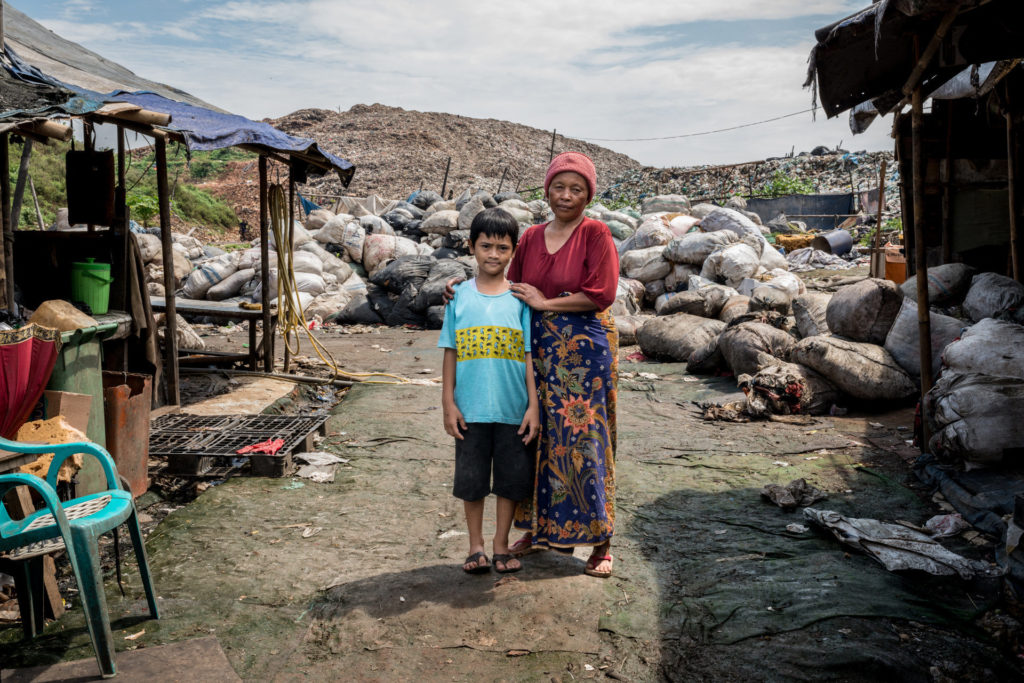
Reza, left, with Mak Muji, the midwife who helped deliver him, in front of his family’s shack. Elisabetta Zavoli for HuffPost
This is life in Bantar Gebang, one of the largest landfills in Asia and the main dumping ground for the megacity of Jakarta. Locals call this place The Mountain. Migrants have been coming to work at the landfill since it opened in the late 1980s. They barely make a dent in the amount of garbage here. Today, their villages are crammed against the edges of trash mounds, which spill around street corners and devour courtyards.
Indonesia is in the midst of a trash crisis, producing faster than it can dispose ― and the more garbage it sends to Bantar Gebang, the more permanent these landfill settlements become, with their shops, food stalls and the need for medical help, such as midwifery. It’s not clear how many pregnant women live here or how many children have been born into this world of decay ― but as Indonesia’s crisis worsens, they’re obviously here to stay.
As many as 3,000 families live within the footprint of the 200-acre dump or on the fringe of its rolling garbage hills. Many of them earn a living off the 7,000 tons of waste unloaded every day from the endless stream of trucks that drive in from the city.
It’s not exactly legal to climb into a landfill ― let alone live inside one ― and pull out recyclables, but the practice is widespread throughout Indonesia. Authorities gladly look the other way.
Trash pickers perform grueling, filthy, dangerous work that fills a gaping hole in the country’s garbage disposal networks, which are chronically mismanaged. In Jakarta, home to 10 million people, official trash collection is spotty on a good day. Recycling services are functionally nonexistent. Throughout Indonesia, half of all plastic waste is mixed in with the rest of the garbage, while the other half gets burned or dumped in rivers. The country is one of the world’s largest sources of ocean plastic pollution.
Against this backdrop, several million people in Indonesia sort and haul away rubbish in an unofficial capacity, estimates Novrizal Tahar, the government’s director of solid waste management. They might go door to door asking for recyclables or pluck items from rubbish bins, roadsides and landfills like Bantar Gebang, then sell their finds to middlemen and recycling facilities. It’s hardly efficient. But efficiency isn’t the waste pickers’ objective ― they’re trying to feed themselves or pay for their kids’ education, not clean up the environment or solve the government’s trash problem.
This kind of work is not unique to Indonesia. Trash pickers can be found in communities all over the globe, from Shanghai to New York, Nairobi to Paris. Landfill slums, where the local economy runs on trash, have been documented in India, Ethiopia and Brazil, to name just a few countries.
The world produced over 2 billion tons of garbage in 2016, a figure that’s expected to balloon 70 percent by 2050, according to a World Bank Report released in September. Jakarta already has an out-of-control waste problem, and Bantar Gebang will be full within the next decade. While the problem gets worse, the number of trash pickers will likely grow.
The midwife who delivered Reza says she has attended about 300 births at Bantar Gebang since moving here 13 years ago.
“The first time I helped a woman in labor, she could not even walk. But, inshallah [God willing], she had a normal birth,” says the midwife, 55, who goes by Mak Muji, meaning “mother of Muji” (her eldest daughter’s name).
Being pregnant in Bantar Gebang comes with few options for health care and enormous social stigmas. Many of the women here have no birth certificates or other official documentation, limiting their access to social services. Husbands don’t always allow pregnant women to travel away from the landfill to visit a public hospital, where they fear they might be ogled by other men. Some women might not want to leave their insular slum for the frenzy of the city or the disdain of outsiders who smell the garbage on their clothes.
Plus, giving birth in a hospital can cost around $100, half a month’s wages for trash pickers in Bantar Gebang.
“Women here do not go to the hospital because they have no economic means,” explained Mak Muji. “Sometimes hospital midwives are not tolerant with people like us. Their questions may embarrass us.”
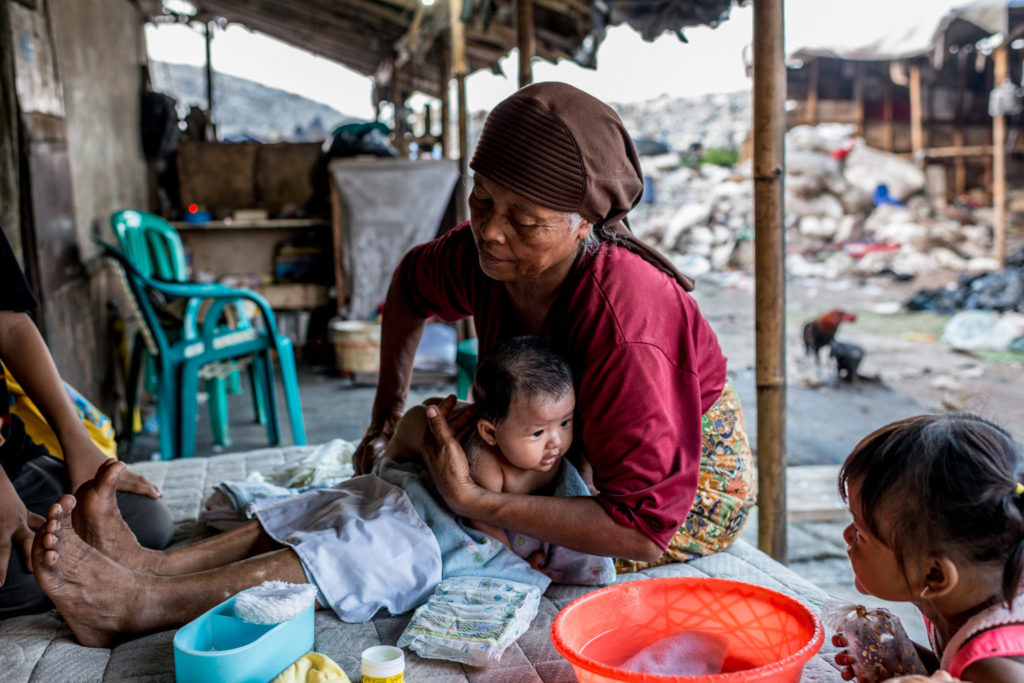
Mak Muji washes Reza’s sister, Aysila Husna, 3 months old. Mak Muji did not deliver the newborn because the family had enough money for a hospital birth this time. But they still live in their shack at the landfill, and Mak Muji visits often. Elisabetta Zavoli for HuffPost
Mak Muji is a rare lifeline, the only midwife in the Bantar Gebang slums who offers her services free. Few understand these women’s needs like she does, a married mother of five who supports her family by scavenging.
The midwife and her husband, a carpenter, came here from another Indonesian island after he was injured in an accident and lost his job. Over time, the family has watched the landfill villages mature around them. Near their home is a tidy mosque and a playground of salvaged toys. Kids fly kites made from litter near a roadside kiosk that sells fresh soap, Coca-Cola, half-melted chocolate bars and kitchen wares.
Mak Muji’s cinder-block home stands out among neighbors’ dwellings of bamboo, braided plant fibers and plastic covered by corrugated metal or waterproof items hauled in from the dump to protect against monsoon rains. She and her husband worked more than a decade at the landfill before they could build their sturdy house, where Mak Muji has her makeshift obstetrics clinic.
In the courtyard outside her home, a few moments’ walk from the edge of the landfill, she and her husband have sorted and stacked large sacks of plastics to sell. Scrawny chickens stand on the bags or scratch at the ground for kitchen scraps. Flies are everywhere.
“I distinguish 12 types of different plastics just by touch,” she says, showing the palms of her hands, grimy from the day’s work.
Inside her home, the clinic is nothing more than a corner of a large room divided for privacy by a wooden wardrobe. At night, she and her husband sit on one side of the wardrobe and watch TV while they eat dinner. On the other side is a mattress on the floor where she examines her patients. They come to her nearly every day, seeking suggestions, consolation or belly massages.
Most of the equipment Mak Muji uses for a birth would fit in a shoebox: scissors and twine, sterile gauze and alcohol, massage oil and shampoo to clean the infants, talc to powder the skin before swaddling. There’s also a scale to weigh the babies.
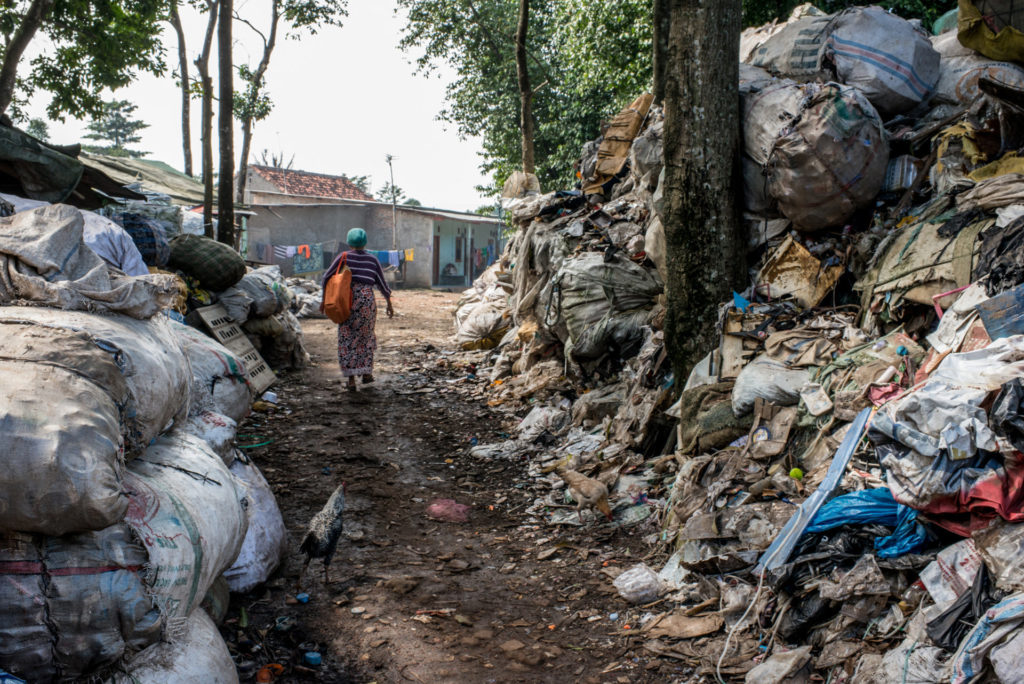
Mak Muji walks through heaps of waste on her way to one of the landfill villages. The orange bag slung over her shoulder holds the scale she uses to weigh newborn babies. Elisabetta Zavoli for HuffPost
The midwife urges parents to register their newborns with the government and send them to school so they might escape the landfill. The community trusts her, values her advice.
But, like so many of the women who raise their families here, Mak Muji is virtually trapped.
Those who come to live in the shadow of Bantar Gebang hail from the countryside with little education and few skills that would translate to life in the city. Mak Muji says she’s no different ― she has no formal training in midwifery, she admits.
“It is a gift given from God to my grandmother,” she said. “I got this talent from her.”
A place like Bantar Gebang offers the promise of easy money for the underskilled. As Indonesia becomes more prosperous ― it’s one of the fastest-growing economies in the world ― income disparity yawns wide. Over the last decade, inequality has risen faster here than in most neighboring countries.
More than 28 million Indonesians, almost 10 percent of the population, live in poverty, according to the World Bank. Meanwhile, scavengers at Bantar Gebang can earn about as much as they would at a minimum-wage job in Jakarta.
“I am grateful and happy because I can work,” Mak Muji insists.
A single household at Bantar Gebang might collect over 200 pounds of trash per day, according to a study published in 2014. The physical toll of this work is enormous. Injuries happen all the time, explains Heru Prasadja, a social scientist at the Atma Jaya Catholic University of Indonesia in Jakarta who co-authored a study on living conditions at the dump. Some of the trash mounds are not stable enough to walk on ― one wrong step could cause the side of a hill to collapse, taking the workers down with it.
Invisible dangers lurk underground, too. The landfill has poisoned the local groundwater, according to Prasadja’s research. Scavengers use the tainted water for rinsing food and bathing, though they purify their drinking and cooking water. Prasadja has documented people eating mushrooms and vegetables grown at Bantar Gebang. People can be seen fishing in stinking pools of water near the site, as well.
Prasadja said it’s common for children who live at the dump to have skin rashes, respiratory diseases and diarrhea.
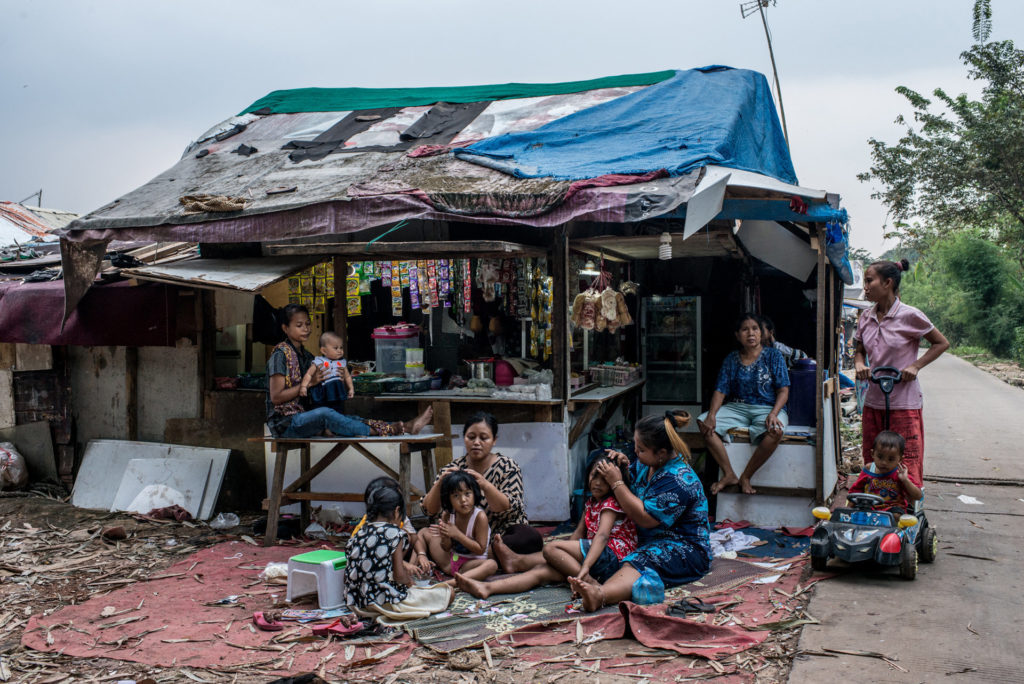
In a village at the edge of the landfill, a kiosk selling food and consumer goods becomes a gathering place for women and children in the evening. Elisabetta Zavoli for HuffPost
Conditions at Bantar Gebang were never supposed to be this bad. The site’s design called for neat layers of trash covered with dirt. Instead, it’s mostly uncovered and uneven. It receives almost double the daily amount of garbage it was designed to handle, and operating budgets never kept pace.
So far, Indonesia’s government hasn’t implemented any successful long-term alternatives to help manage its waste problems. Worse, it passively allows people to scavenge landfills yet offers few protections for the service they do.
Waste pickers’ jobs are unregulated, says Annisa Paramita, head of communications at Waste4Change, a recycling management company based in Jakarta. “They pay no tax and get no social contribution, no economic or health security,” she added.
Officials might publicly praise trash pickers ― Novrizal calls them “heroes” ― but they occupy one of the lowest rungs of the social order. “‘Here come the rats,’ people say in Jakarta when scavengers come to rummage in the garbage,” Prasadja explained.
Researchers estimate that, despite the work of trash pickers, thousands of tons of plastic waste flow into the ocean around Indonesia every year. Only China dumps more plastic into marine ecosystems. In April, Indonesia’s president had to dispatch the army to break up a mass of plastic refuse choking a river in Bandung, one of the country’s largest cities. The BBC called the effort a “seemingly futile task because all the time more plastic flowed their way from further upstream.”
Many food items in Indonesia still come wrapped in traditional biodegradable materials, like banana leaves, that might typically get tossed into a ditch or river, where rains will break them up and wash them away. But plastic is becoming more widely used, and old habits die hard. Discarded plastic packaging, which can linger for years in the environment before breaking down, piles up and clogs waterways or litters beaches.
The government is slowly working to raise awareness of the problem and promote new habits. Having pledged to slash 70 percent of its ocean plastic waste by 2025, the country plans to improve garbage and recycling collection efforts, and train cities and individuals to sort and separate their junk.
But recent efforts at curbing pollution have fallen short. For instance, the government’s plan to implement a tax on plastic bags stalled earlier this year.
Jakarta recently established small, local recycling centers known as waste banks, where folks can deliver their paper, plastic, bottles and metal in exchange for a small amount of cash. However, only 30 of the city’s 200 waste banks are operating, due to a shortage of staff and machines that shred or crush plastics, Paramita said.
The government also plans to build waste-to-energy factories that will convert some of Bantar Gebang’s trash into electricity. Construction is expected to begin later this year. There’s already a small pilot factory at Bantar Gebang, though it barely has a noticeable effect on the daily amount of trash sent to the landfill.
Some experts say the government ought to formalize the networks of undocumented trash collectors, incorporate them into the official waste stream and work with the existing manpower before turning to other solutions.
“Instead of building new landfills, or recycling centers, one should upscale what already exists,” Paramita said. “The infrastructure, without an organized system behind it, does not work.”
She added that it would go a long way toward restoring the dignity of the waste pickers if the government offered them health services and a clean, safe place to work.
Brazil has already formalized waste pickers on a national scale, and local efforts have taken place in Colombia and the Philippines, according to the World Bank.
Until that happens in Indonesia, life at Bantar Gebang will continue much as it has. Mak Muji’s husband, with the help of one of their sons, is building a second story for their home. He wants his wife to have a larger, brighter area to deliver babies.
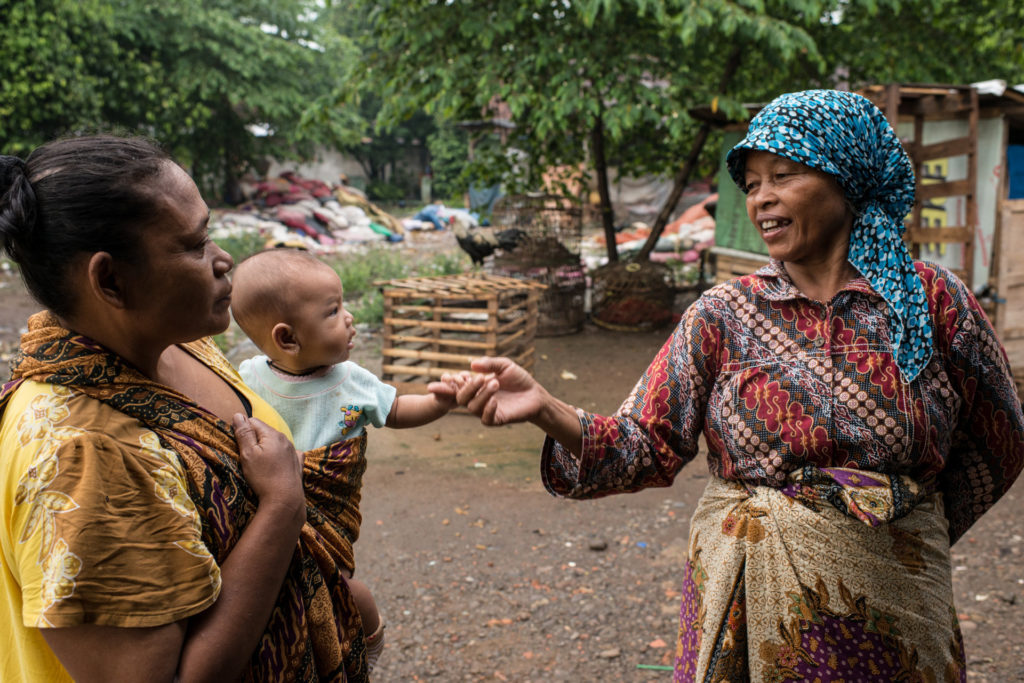
Mak Muji, on a stroll through her village, greets a mother holding a baby she helped deliver. Elisabetta Zavoli for HuffPost
Maj Muji is proud of her role in the community and says her goal as a trash picker has been to provide better opportunities for her kids, two of whom she’s sent to college with her trash harvest earnings. They are a unique family in Bantar Gebang. To many trash pickers, education can seem like a waste of money. But Mak Muji believes it’s the only way out of this life.
“My hope for my children is that they understand the importance of going to school and persevering in their studies,” she said. “I cannot give them a material heritage, but the important thing is knowledge.”
Mak Muji sometimes drops in to check on Sairoh and her family. She tells the young mom to make sure 9-year-old Reza stays in school. He’s a gifted student and wants to be a doctor. Keep him off the landfill, Mak Muji cautions Sairoh, who dropped out of high school to raise the boy.
As the midwife continues to toil in the slums around the landfill, she sees more and more families putting down roots. Brick and concrete-block houses are appearing all over Bantar Gebang. One of Mak Muji’s neighbors has planted a bonsai tree on his tiny plot of land; he says working in his garden gives him peace. Other neighbors beautify their doorways by hanging songbird cages out front.
Some of these waste pickers dream of leaving; others prefer to stay close to what they know. For now, all of them call this place home.
____________________________________________________
 Jacopo Pasotti is a Italian journalist based in Switzerland. His work focuses on environmental and social reporting.
Jacopo Pasotti is a Italian journalist based in Switzerland. His work focuses on environmental and social reporting.
Elisabetta Zavoli is an Italian freelance photographer focusing on global environmental issues and their local consequences.
Go to Original – huffingtonpost.com
DISCLAIMER: The statements, views and opinions expressed in pieces republished here are solely those of the authors and do not necessarily represent those of TMS. In accordance with title 17 U.S.C. section 107, this material is distributed without profit to those who have expressed a prior interest in receiving the included information for research and educational purposes. TMS has no affiliation whatsoever with the originator of this article nor is TMS endorsed or sponsored by the originator. “GO TO ORIGINAL” links are provided as a convenience to our readers and allow for verification of authenticity. However, as originating pages are often updated by their originating host sites, the versions posted may not match the versions our readers view when clicking the “GO TO ORIGINAL” links. This site contains copyrighted material the use of which has not always been specifically authorized by the copyright owner. We are making such material available in our efforts to advance understanding of environmental, political, human rights, economic, democracy, scientific, and social justice issues, etc. We believe this constitutes a ‘fair use’ of any such copyrighted material as provided for in section 107 of the US Copyright Law. In accordance with Title 17 U.S.C. Section 107, the material on this site is distributed without profit to those who have expressed a prior interest in receiving the included information for research and educational purposes. For more information go to: http://www.law.cornell.edu/uscode/17/107.shtml. If you wish to use copyrighted material from this site for purposes of your own that go beyond ‘fair use’, you must obtain permission from the copyright owner.
Read more
Click here to go to the current weekly digest or pick another article:
IN FOCUS:
- Mineral Deal Gives the US Total Control over Ukraine's Future
- Trump and Putin’s Unofficial Covert Alliance
- We Will Not Move One Solitary Inch Towards Your Armageddon
HUMAN RIGHTS:
- How the Human Rights Industry Manufactures Consent for “Regime Change”
- Genocide Emergency: Gaza and the West Bank 2024
- ‘We Will Leave When the Last Palestinian Leaves’: The Defiant Last Stand of the Doctors of Kamal Adwan Hospital
HEALTH:
- U.S. Terminates Funding for Polio, H.I.V., Malaria and Nutrition Programs Around the World
- Autism, Made in the USA
- Big Pharma Is a Big Menace to Global Health
ASIA--PACIFIC:
- The Hawaiians Who Want Their Nation Back
- The Hidden Meaning of the Martial Law in South Korea
- The Machu Picchu Declaration of the Asia-Pacific Economic Cooperation-APEC 2024
ENVIRONMENT:
